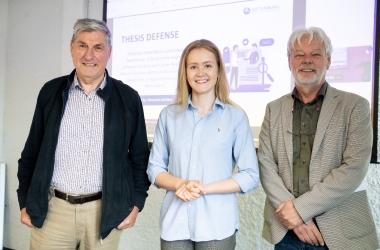Student's Research Highlights Barriers to Non-EU Graduate Employability
Student's Research Highlights Barriers to Non-EU Graduate Employability
Student's Research Highlights Barriers to Non-EU Graduate Employability

https://www.wittenborg.eu/students-research-highlights-barriers-non-eu-graduate-employability.htm
Alexandra Kukhtina’s Study Explores Perspectives from Employers and Students
Inspired by her own experiences in the Netherlands, Wittenborg graduate Alexandra Kukhtina chose to write her graduation assignment on the challenges faced by non-EU students trying to start a career in the country. Originally from Russia, Alexandra recently completed a bachelor’s degree in International Business Administration (IBA), with a specialisation in Economics and Management.
Alexandra says that, with increasing global mobility and a growing number of international students in the Netherlands, it's important to understand how universities of applied sciences (UAS) can better prepare students for real-world employment. “I chose this topic because I personally experienced some of these challenges and wanted to explore how education, employers’ expectations of graduates and students’ individual choices intersect to influence career outcomes.”
To gather information for her study, Alexandra adopted a qualitative research approach, conducting 18 semi-structured interviews with recent non-EU bachelor’s graduates in business administration from universities of applied sciences, as well as with employers from various sectors. She also performed a secondary analysis of UAS curricula to triangulate her findings.
Among other topics, the interviews explored the gaps between soft and hard skills, as well as the extent to which graduates can apply the knowledge they acquired in practice. The questions also addressed whether the Dutch language poses a barrier to employability, the role of internships, the relevance of career-support modules offered by higher education institutions and visa sponsorship barriers faced by students.
The research shows that employers value soft skills like communication, adaptability, flexibility, cultural awareness and emotional intelligence more than complex technical skills, which are considered teachable. They also emphasised that visa sponsorship is a structural obstacle to the employment of non-EU graduates.
Graduates, on the other hand, appreciate the strong theoretical foundation provided by universities of applied sciences. However, they report problems such as scarce practical training, insufficient professional support, limited knowledge of Dutch and immigration barriers – including visa sponsorship and unrealistic salary threshold requirements for entry-level positions.
Alexandra points out that an analysis of the curricula revealed variations in practical emphasis. “While some successfully integrate applied learning, others still rely heavily on lectures and individual assignments. So, although they show a clear commitment to aligning education with labour market needs, the level of integration is not yet consistent across all institutions.”
Additionally, she offers several recommendations for institutions to enhance graduate employability, such as strengthening digital skills training, expanding career support, integrating longer internships earlier in the programme, ensuring consistency in practical learning and offering optional Dutch language education throughout the curriculum. “Current students should start learning Dutch early, approach job searching as a long-term strategy, develop key technical skills independently if needed, use LinkedIn actively and choose internships that offer real mentoring and networking opportunities.”
According to Alexandra, the interviews were the most enjoyable part of her research. “Hearing firsthand from employers about what they value in candidates and from graduates about what they wish they’d known was incredibly eye-opening. It made the whole research process feel real and relevant. It gave me both motivation and clarity, knowing that the research could have practical value for many students.”
She advises current students to choose a topic that genuinely interests them. “You’ll hit moments of doubt or fatigue, and it’s your interest in the topic that will keep you going. Be proactive, ask for feedback and don’t be afraid to reach out to people.”
As a recent graduate, Alexandra is focused on exploring different opportunities and continuing to learn, both professionally and personally. “I'm interested in identifying where my strengths can add value and how I can use them to support others, whether that’s in a team, a project or a business context. I’m keeping an open mind and treating this next phase as a time for growth, discovery and meaningful contribution,” she emphasises.
WUP 18/09/2025
by Ulisses Sawczuk
©WUAS Press
Tags
#SDG3: Good Health and Well-being
#SDG8: Decent Work and Economic Growth
#Internationalisation
#Diversity
#highered
#research
#studyinholland
669 words